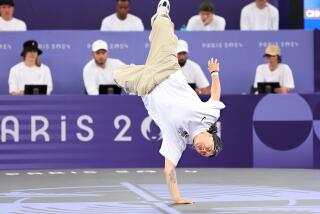Master of Korean Martial Art Aims for Olympic Post
As Kwon Sun Choi talked to a visitor in a tiny office in a San Pedro martial arts studio, barefoot little kids dressed in white robes continually interrupted.
“An Nyung He Ke Ship Si O , “ each repeated rapidly, almost unintelligibly. The office door would spring open and close almost immediately.
Choi, a master in the Korean art of self-defense called taekwondo, was not upset. In fact, he smiled and nodded each time as the youths in Do-Boks stuck their heads through the crack of the door, to the amusement of the visitor.
“This country is too free,” Choi said. “Taekwondo teaches respect and discipline to these kids.”
A two-time coach at the United States Olympic Festival, Choi is a sixth-degree black belt in a martial art that is among the fastest-growing leisure activities in America.
An 11-time national champion in his native Korea, he has no reservations in declaring his intent to someday become the coach of the U.S. Olympic team. In the 1992 games, in Barcelona, Spain, taekwondo will be a demonstration sport.
Choi, 35, was the first coach west of the Mississippi to be selected for an Olympic Festival post from more than 3,000 masters in the country. He is best-known for his advancement of New Form Competition Style Techniques, one of several schools of thought in the event.
“At his age, he is right at the top of the sport,” said Chan Yong Kim, president of the California Taekwondo Assn.
Taekwondo is basically a defensive sport, unlike other forms of martial arts such as judo and karate, according to Lou Solo, manager of the Tae Kwon Do Training Center.
Literally translated, Tae Kwon Do (it has been condensed to one word in the United States) means “the art of hand and foot fighting.” Students learn poomse, a ritual mind-set that prepares them to “always block, never attack, then defend yourself,” explained Solo.
The masters are the supreme leaders. Their positions command respect. On this day everyone at the studio referred to Choi as Master Choi, and everyone, including the guests, followed a time-honored Korean tradition of removing their shoes before entering the building.
The seemingly impolite students who popped through the door to say “An Nyung He Ke Ship Si O” were actually paying respect to their master by saying goodby after an early-evening practice session at the storefront center on Pacific Avenue.
Even masters have masters (called grand masters) of their own to perpetuate further study and respect. Choi is president of the Do Jongs, an elite intercommittee of the state association. Through learning, Choi says, he hopes to perfect new methods of training that will set him apart from other masters who might also seek the U.S. Olympic post.
“Everything is changing,” he said. “I need more study.” Choi hopes such education will allow him to become a grand master.
“For people of Choi’s caliber, this is not just a martial art, it is a way of life,” said Mike Furman, president of the center’s Black Belt Club and parent of two of Choi’s pupils.
Choi studied at Sung Kyun Kwan University in Seoul, then left more than a decade ago to teach taekwondo in other parts of the world. He spent six years in Spain, then moved to Los Angeles, where a grand master enticed him to enter business at the studio in San Pedro.
He dreams of being a high school physical education teacher here, but the drive to be an Olympic head coach is strong enough that he admits he will leave this country if he gets a good offer somewhere else.
Kim, the state taekwondo chief, said Choi is almost a lock for some type of Olympic coaching spot in this country. “I’m optimistic that he will play a major role on the coaching staff (of the United States).”
If Choi does leave, that would be bad news to people such as Solo and Furman, who have helped Choi develop a highly successful taekwando junior team.
Recently, three of his students qualified to participate in the first International Junior Festival. A year ago, at the National Junior Olympics, the team won 10 medals, including six golds.
Said Furman: “Choi has such an eye for talent.”
Choi, speaking with a heavy Korean accent, prefers to spread the gospel of taekwando, rather than talk about himself. “Taekwando is mental training,” he said. “Whoever needs discipline and physical improvement can use it.”
During a session with the youths, ages 7-15, Choi put his charges through a treadmill of moves, speaking only Korean. American and Korean flags hung on a wall, and pictures of students in various sparring matches ringed the room. Students are required to know all commands in Korean. Still, a sign in English said: “No pain, no gain.”
The children handled it all in stride. When ordered to attention or to sit, even the little ones obeyed immediately with shouts of, “Yes, sir.”
Watching from the sidelines, Solo, an American-born black belt, said: “Taekwondo is constant discipline.”
Choi, who began to study the sport at 8, explained that taekwondo training in Korea begins in kindergarten and continues as part of school curriculum into college.
Choi would like to see the same field of study introduced in United States. He claims to have turned around several wayward youths in his five years at the center.
More to Read
Go beyond the scoreboard
Get the latest on L.A.'s teams in the daily Sports Report newsletter.
You may occasionally receive promotional content from the Los Angeles Times.






